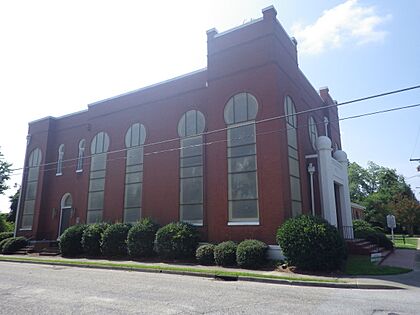Temple Sinai (Sumter, South Carolina) facts for kids
Quick facts for kids Temple Sinai |
|
|---|---|

Temple Sinai in 2014
|
|
| Religion | |
| Affiliation | Reform Judaism |
| Ecclesiastical or organizational status | Synagogue |
| Leadership | Lay led |
| Status | Active |
| Location | |
| Location | 11-13 Church Street, Sumter, South Carolina 29150 |
| Country | United States |
| Architecture | |
| Architectural type | Synagogue |
| Architectural style | Moorish Revival |
| Date established | 1895 (as a congregation) |
| Completed | 1912 |
| Materials | Brick |
Temple Sinai, also known as Congregation Sinai, is a historic Reform Jewish place of worship. Its official name is the Sumter Society of Israelites. It is located in Sumter, South Carolina, in the United States.
The building is made of brick and was finished in 1912. It was built in the Moorish Revival style, which means it looks like buildings from ancient Moorish architecture. Temple Sinai was added to the National Register of Historic Places on January 21, 1999. It also has the Temple Sinai Jewish History Center, which opened in June 2018.
Contents
History of Temple Sinai
Early Jewish Settlers in Sumter
The first Jewish people to settle in Sumter came from Charleston in 1815. They were Sephardi Jews, meaning their families originally came from the Iberian Peninsula (Spain and Portugal).
Forming the Congregation
Congregation Sinai was officially formed in April 1895. This happened when two groups, the Hebrew Cemetery Society and the Sumter Hebrew Benevolent Society, joined together. At first, rabbis from Charleston and Augusta, Georgia would visit to lead services. In 1904, Rabbi Jacob Klein moved to Sumter and became the first full-time rabbi for Temple Sinai.
Building the Temple
The main part of the current temple, called the sanctuary, was built in 1912. It faces Church Street and replaced an older wooden synagogue that was in the same spot.
Adding More Space
Over the years, more buildings were added to the temple.
- In 1932, the Barnett Memorial Addition was built. This two-story brick building is behind the sanctuary and matches its Moorish Revival style. It has an auditorium, a banquet hall, classrooms, and offices.
- In 1956, the Hyman Brody Building was added. This one-story brick building is attached to the back of the Barnett Memorial Addition. It provides a kitchen, more classrooms, offices, and restrooms. Even though it's simpler, it still has some Moorish design elements.
Preserving History
The old records and historical documents of Temple Sinai have been given to the Jewish Heritage Collection. This collection is kept at the College of Charleston, helping to preserve the temple's long history.
Beautiful Stained Glass Windows
Temple Sinai is famous for its eleven beautiful stained glass windows. These windows are on the sides and at the entrance of the building. They show different scenes from the Tanakh, which is the Hebrew Bible.
Most of the windows are very large, about 5 feet wide and 20 feet tall. They are shaped to look like the castle-like towers with domes that are part of the temple's entrance. There is also one round window high above the main entrance.
Temple Sinai Today
Working Together for the Future
Temple Sinai has made agreements with other groups to help keep its cemetery and temple in good condition for a long time. These groups include the Coastal Community Foundation, the Kahal Kadosh Beth Elohim Synagogue, and the Charleston Jewish Federation.
The Jewish History Center
In 2015, Temple Sinai started a partnership with the Sumter County Museum. Their goal was to create a special exhibit about Jewish history in South Carolina and specifically in Sumter. This exhibit also includes a section about the Holocaust and how Sumter was connected to it. The Temple Sinai Jewish History Center opened to the public on June 2, 2018.
See also
 | Aaron Henry |
 | T. R. M. Howard |
 | Jesse Jackson |


